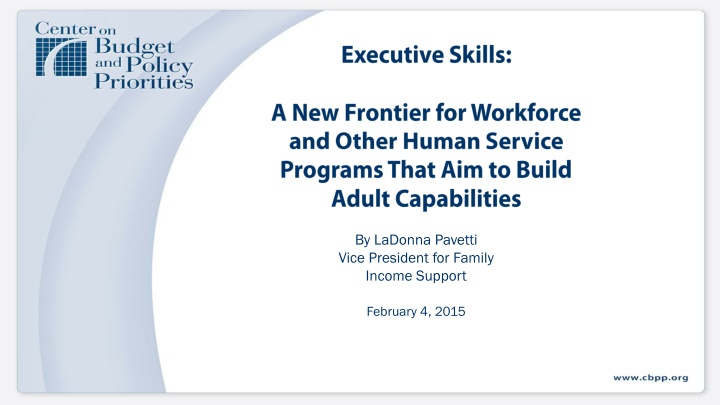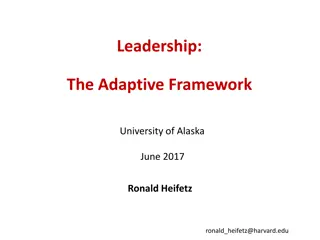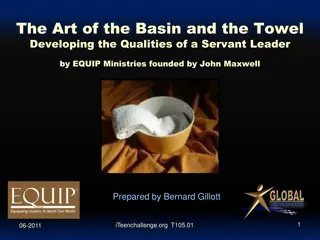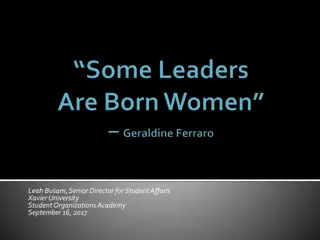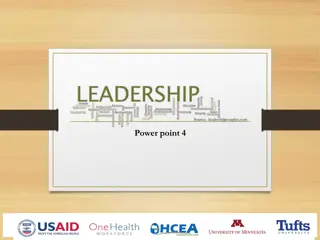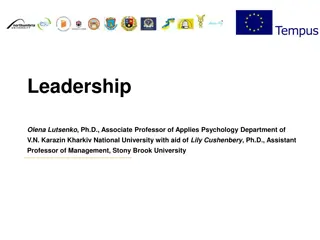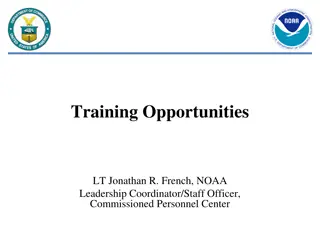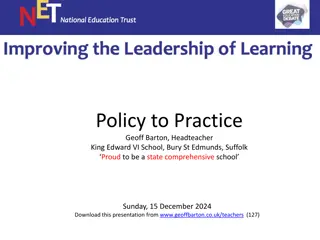Biblical Perspectives on Leadership
Delve into the stories of Saint Peter and Saint Paul as they answer the divine call to leadership. Discover the defining moments in their spiritual journeys and how they embraced their roles as leaders in the early church. Explore the Charism and Call to Leadership, learning from their encounters with Jesus and the lessons they teach about humility, faith, and courage.
Download Presentation

Please find below an Image/Link to download the presentation.
The content on the website is provided AS IS for your information and personal use only. It may not be sold, licensed, or shared on other websites without obtaining consent from the author.If you encounter any issues during the download, it is possible that the publisher has removed the file from their server.
You are allowed to download the files provided on this website for personal or commercial use, subject to the condition that they are used lawfully. All files are the property of their respective owners.
The content on the website is provided AS IS for your information and personal use only. It may not be sold, licensed, or shared on other websites without obtaining consent from the author.
E N D
Presentation Transcript
By LaDonna Pavetti Vice President for Family Income Support February 4, 2015
Why the Interest in Executive Skills for Adults? Modest success, even in the most effective employment programs Declining employment among single mothers with high school education or less for most of the last 10 years Cash assistance provided to very few families Evidence that if we teach life skills we can do better Two-generation concerns: need to invest in adults to see big improvements in outcomes for kids
Evidence that moving in new directions could yield positive results
Impetus for applying executive function principles to programs for disadvantaged adults comes out of a concern for improving outcomes for children Theory of Change Supporting A Focus on Adults Frontiers of Innovation, Center on the Developing Child at Harvard University Protecting children from the impacts of toxic stress requires selective skill building not simply the provision of information and support for the adults who care for them; Interventions that improve the caregiving environment by strengthening the executive function and self-regulation skills will also enhance their employability, thereby providing an opportunity to augment child outcomes by strengthening the economic and social stability of the family; and Community-based initiatives and broad-based, systems approaches are likely to be more effective in promoting healthy development and reducing intergenerational disparities if they focus explicitly on strengthening neighborhood-level resources and capacities that buffer young children from the adverse impacts of toxic stress.
Why Executive Skills Matter Executive Function skills are critical for: Job success poor executive functions lead to poor productivity and difficulty finding and keeping a job (Prince et al. 2007) Cognitive, social, and psychological development Success in school and in life For mental and physical health
What are Executive Skills? One definition: conscious control of what we think and do; neurocognitive processes involved in goal-directed behavior (Phil D. Zelazo, Ph.D., Neuroscientist, University of Minnesota) Useful to think of executive function as having two dimensions: Process dimension: The steps we go through to achieve a goal Skill dimension: The skills we draw on at each stage of the process in order to be successful
An Executive Function Framework Phil D. Zelazo, Neuroscientist, University of Minnesota
Executive Skills Peg Dawson and Richard Guare, Mental Health Practitioners and Authors Skills Involving Doing (Behavior) Skills Involving Thinking (Cognition) Working memory: Ability to hold information in memory while performing complex tasks; incorporates ability to draw on past learning or experience to apply to current situations Planning/prioritization: The ability to create a roadmap to reach a goal or to complete a task; making decisions about what s important to focus on Organization: The ability to create and maintain systems to keep track of information or materials Time management: The capacity to estimate how much time one has, how to allocate it, and how to stay within time limits and deadlines Metacognition: The ability to monitor oneself; ability to ask oneself how am I doing or how did I do? Response Inhibition: Capacity to think before you act Emotional control: The ability to manage emotions to achieve goals, complete tasks, or control and direct behavior Sustained attention: The capacity to keep paying attention to a situation or task in spite of distractibility, fatigue or boredom Task initiation: The ability to begin a task or activity without undue procrastination and to independently generate ideas, responses, or problem-solving strategies. Goal-directed persistence: The capacity to have a goal, follow through to the completion of the goal, and not be distracted by competing interests Cognitive flexibility: The ability to revise plans in the face of obstacles, setbacks, new information, or mistakes Stress tolerance: the ability to thrive in stressful situations and to cope with uncertainty, change, and performance demands. From: Smart but Scattered by Peg Dawson, Ed.D. and Richard Guare, Ph.D., 2009
Executive Function Processes and Skills Are Interconnected Silvia Bunge, Neuroscientist, University of California at Berkley SELF-CONTROL PLANNING MONITORING
Goal Achievement and Executive Skills Goal Achievement Process Purpose Executive Skills Set Metacognition, working memory Establish meaningful, achievable goals Plan Planning/prioritization, time management, working memory, task initiation Develop a plan for meeting goals Act Task Task initiation, response inhibition, , response inhibition, time management, sustained time management, sustained attention, working memory attention, working memory Put the plan into action Review/ Revise Metacognition, flexibility, Metacognition, flexibility, working memory working memory Review the plan to assess what worked and revise it as necessary
Factors that Impair Executive Functions Loneliness Poor nutrition Stress Lack of sleep Lack of exercise Sadness If we ignore that someone is stressed, lonely, or not healthy because of poor nutrition, lack of sleep or lack of exercise, those unmet needs will work against that person exercising the executive functions s/he needs to function properly at work and at home. Adele Diamond University of British Columbia
How Do we Improve Executive Function Skills? Work on reducing things that impair executive functions such as stress, lack of connections and lack of sleep Find ways to reduce the demands on executive function skills (e.g., change the environment, provide tools to make the task easier --like using a cellphone app for reminders; folders for organizing documents) Work on explicitly building EF skills: break them into small steps, train them, challenge them and practice them in the context in which they will be used
Key Concepts for Improving Executive Function Skills: Motivation Motivation is a critical building block for understanding and addressing executive function weaknesses. What motivates adults: Independence and autonomous decision making Having opinions valued Deciding/negotiating what support they will need and having it available Stress relief Attainable goals and successes Short-term, frequent and immediate incentives Praise for effort
Key Concepts for Improving Executive Function Skills: Effort Effort expected needs to be consistent with some s ability to engage in effortful work: Using executive function skills, especially those that are weak, requires significant effort Results in rapid energy depletion and susceptibility to doing things the way you ve always done them Need to modify task demands to match the person s capacity for effortful work
Key Concepts for Improving Executive Skills: Short Time Horizons Short time horizons are critical for helping to address executive skill weaknesses: Short time horizons help in reducing stress by making people feel less overwhelmed Short time horizons support breaking tasks into small steps Small steps with short time horizons are an effective way to build early successes which in turn help to build or sustain motivation
Key Elements of an ES-Informed Approach Setting Goals Program expectations for an individual are consistent with their ability to successfully engage in effortful tasks. Individual goals are challenging, but achievable and meaningful. Intermediate goals that have a short time horizon are viewed as meaningful and are supported. Planning Plans are individualized and specific. Plans provide a roadmap for reaching goals. Plans are dynamic, not static.
Key Elements of an ES-Informed Approach Action Providing Supports for Success The program helps individuals to recognize their executive skill strengths and weaknesses and helps them to identify ways to use their strengths to compensate for their weaknesses. Coaching is used to facilitate achievement of a goal and development of skills; coaches act as a guide and facilitator through the stages of the goal-setting process. The program helps individuals improve their ability to handle stress and/or helps them to reduce stress in their lives.
Key Elements of an ES-Informed Approach Action Providing Supports for Success (con t) The program understands and supports strategies for modifying the environment (or the task) to lessen the negative impact of executive skill weaknesses. Opportunities for participants to build executive function skills are built into the program. Incentives are used thoughtfully and systematically to help individuals maintain the effort and motivation needed to work towards achieving a longer-term goal. Review/Revise Processes for review and reflection are an integral part of the program. Plans are updated regularly.
For more information www.buildingbetterprograms.org (Executive Function and Webinar Tabs) Pavetti@cbpp.org
